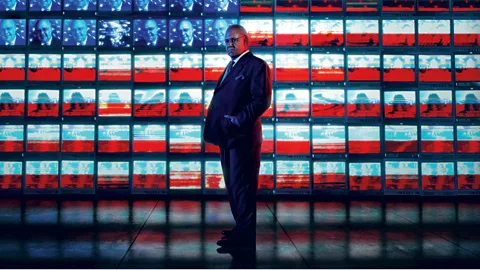The Loudest Voice review
 Showtime
ShowtimeA show about former Fox News bully Roger Ailes is notable for featuring Russell Crowe under layers of prosthetics. But even he can’t save a bland drama, writes Caryn James.
Roger Ailes’s physical presence in The Loudest Voice is startling: Russell Crowe under layers of prosthetics, all jowls and stomach, bald head and beady eyes. The real Ailes was just that outsized. He was the man who created the Fox News Channel, and made it a powerhouse in right-wing politics in the US. Then, in 2016, decades of sexual harassment caught up with him and he was forced to resign. It’s a story fraught with drama that this series tells in a timid, self-defeating way.
Who is the show’s Roger Ailes, anyway? The Loudest Voice doesn’t defend him. Yet it seems unwilling to depict him as an evil genius, even when he tilts the news and sways opinions without regard for facts. Worst of all, it fails to give him the human depth that might have explained him. This bland seven-parter is proof that a fine actor in disguise is never enough.
Episode one begins with Ailes dead on the floor following a fall, the year after Fox anchor Gretchen Carlson (Naomi Watts) accused him of harassment, opening the door for other women to report similar encounters. In voiceover – a device that unably vanishes after its opening use – Ailes says he knows that people think he is “right-wing, paranoid, fat.” He its to his girth and conservatism.
In clumsy scenes set in meeting rooms and offices, Ailes makes sudden, brilliant pronouncements about the media. As Fox News is ramping up, he tells one of those meetings that politically conservative Americans are an underserved audience that their channel could own. The paranoia comes in when he adds what would become Fox’s famous “Fair and Balanced” tagline. The rest of the media has a liberal bias, he claims, and Fox would simply be restoring the balance by tilting to the right. The content of Ailes's dialogue is eye-opening, exposing his spin; but as drama, such bluntness is flat.
Crowe manages Ailes’s mood swings easily. He can be calm and flattering one minute, exploding in anger the next. He’s a bully. But the real glimpses of character emerge in the occasional quieter moments. There is a gleam in Crowe’s eye whenever Ailes outwits other powerful men. He can even cow his boss, Rupert Murdoch (Simon McBurney).
In too many scenes, though, The Loudest Voice dutifully follows Gabriel Sherman’s fact-filled but staid 2014 biography The Loudest Voice in the Room. Ailes the opportunist tells his staff to show disturbing images of people leaping from the World Trade Center on 9/11. Ailes the ideologue seems to have the George W Bush White House on speed dial, and orchestrates Fox programming to help the istration sell the war in Iraq.
 Showtime
ShowtimeThe show is surprisingly haphazard in dealing with the harassment. In the first four episodes (the last three were not available to preview) that subject is reduced to something Ailes does in his spare time. Watts doesn’t appear until episodes three and four, and even then, briefly. At this stage, Carlson is still hiding her frustration with Ailes, who reminds her that she was a Miss America and asks her to twirl in front of him. Presumably Naomi Watts will be given more to do than twirl.
In the early episodes his abuse of women is explored primarily through the experiences of one real-life Fox employee Laurie Luhn (Annabelle Wallis). She meets Ailes in hotel rooms, where we see the distress on her face. The series is murky about how he might have coerced or threatened her.
As Ailes’s wife, Sienna Miller eventually wears almost as many layers of facial prosthetics as Crowe. Beth Ailes goes from an independent career woman to a stay-at-home mother who blindly follows her husband’s lead, a change we see happen without understanding how.
The show’s most provocative theme is that Ailes was a forerunner of President Trump – something hinted at, until it is suddenly bludgeoned home. Ailes used the same playbook as Trump (who doesn’t appear as a character in the TV programme), putting political expediency before facts. When Fox correspondent Geraldo Rivera is caught falsifying his location in Afghanistan, Ailes refuses to apologise, justifying the deceit as “the fog of war”. He promotes the anti-Obama birther movement, one of Trump’s signature obsessions. The Loudest Voice doesn’t draw those connections until episode three, when Ailes gives a speech in his Ohio hometown and declares, “We can make America great again.” Ailes did not, in fact, invent Trump’s campaign slogan; Ronald Reagan used it in 1980. But the series employs it as one more heavy-handed, groan-worthy element.
Ailes won’t disappear. A film with John Lithgow as Ailes and Nicole Kidman as Carlson will focus on his downfall and is scheduled to be released in December. And why not? We’re still waiting for a good screen version of the Ailes story. The Loudest Voice is a wasted opportunity.
★★☆☆☆
Love TV? BBC Culture’s TV fans on Facebook, a community for television fanatics all over the world.
If you would like to comment on this story or anything else you have seen on BBC Culture, head over to our Facebook page or message us on Twitter.
And if you liked this story, sign up for the weekly bbc.com features newsletter, called “If You Only Read 6 Things This Week”. A handpicked selection of stories from BBC Future, Culture, Capital and Travel, delivered to your inbox every Friday.
